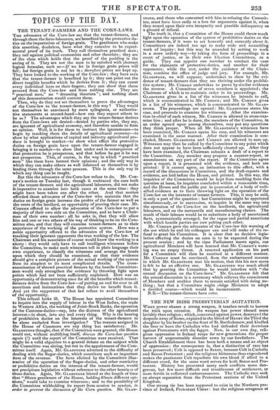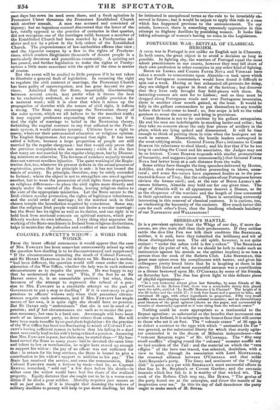THE NEW IRISH PRESBYTERIAN AGITATION.
WHEN power abuses a strong weapon, it teaches revolt to borrow the trick upon occasion. No weapon has power abused more lavishly than religion ; which, converted against power, destroyed the despotic sway of Rome, expiated in the blood of HENRY the Third the slaughter by his brother on the feast of St. Bartholomew, and kindled the fires to burn the Catholics who had defended their doctriuea against Protestants with the faggot. Now, in our own day, reli- gious oppression in Ireland reaps for new generations the proper harvest of ungovernable disorder sown by our forefathers. The Church Establishment there has been both a means and an object of oppression : the consequence is, that a distinction of race has been preserved; Celt is opposed to Saxon, because Celt is Catholic and Saxon Protestant ; and the religious bitterness thus engendered makes the passionate Celt repudiate his own blood if allied to a different creed, for the same word serves for both Saxon and Pro- testant. History has presented many such conflicts more dan- gerous, but few more difficult and troublesome of settlement, or more fertile in collateral embarrassments. The Catholic race seek an abrupt separation from the Protestant sections of the United Kingdom.
One strong tie has been supposed to exist in the Northern pro- vince of Ireland, Protestant Ulster : but the religious arrogance of past days has sown its seed even there, and a fresh agitation in Protestant Ulster threatens the Protestant Established Church with another assault. A man was accused and convicted of bigamy; but an ingenious counsel discovered that the letter of the law, totally opposed to the practice of centuries in that quarter, did not recognize one of the marriages valid, because a member of The Established Church had been married by a Presbyterian mi- nister and not by a priest in the holy orders of the Established Church. The preponderance of law-authorities affirms that view ; and the bigamist escapes by a flaw in the rights of Presbyte- rians, which renders illegitimate thousands of decent people in a particularly decorous and punctilious community. A quieting act has passed, and further legislation to make the rights of Presby- terians a little more accordant with the spirit of the time is matter of course.
But the event will be studied to little purpose if it be not taken to illustrate a general fault of legislation. In assuming the right to regulate the civil contract of marriage, the Protestant Church has been guilty of supererogation, and has gone beyond its pro- vince. Admitted that the State, impartially discriminating between several creeds, may prefer what it deems the best to be exclusively endowed, as a matter of public provision for a national want ; still it is clear that when it mixes up the propagation of doctrine with the tenure of civil right, it inflicts a wrong. The State may encourage the Newtonian theory of the solar system, which we all believe to be the manifest truth ; it may support professors expounding that system ; but if it tied the right of marriage to belief in the Newtonian theory, forbidding the nuptial contract to any that adhered to the Ptole- maic system, it would exercise tyranny. Citizens have a right to marry, whatever their astronomical education or religious opinion. The English Registration Act recognized that right. It has been called a failure, because a large proportion of people are still married by the regular clergymen : but that would only prove that the previous compulsion was not necessary ; while it is the fact that many are not married by the regular clergymen, but by Dissent- ing ministers or otherwise. The fewness of numbers unjustly treated does not warrant needless injustice. The quiet working of the Regis- tration Act, too, whatever its present defects in the actual process of registration, proves that its principle is safe : it has not loosed the bands of society. Its principle, therefore, may be safely extended to Ireland ; where the object is not to strengthen one creed against another, but to wean the possession of civil rights from dependence on religious differences—to place the civil rights more directly and simply under the control of the State, leaving religious duties to the care of the appropriate ministries. Let the State secure to the Irish citizen secular protection, the rights of legitimate inheritance, and the social order of marriage ; let the married seek in their chosen temple the benediction required by conscience. Some say, that the religious Irish people would not desire a secular marriage : but the State has its rights as well as its duties, and one right is to hold back from sectional contests on spiritual matters, which pro- fitlessly weaken its own influence. Every thing that separates the working of the State-machinery in Ireland from religious distinctions, helps to neutralize the jealousies and conflict of race and faction.



























 Previous page
Previous page